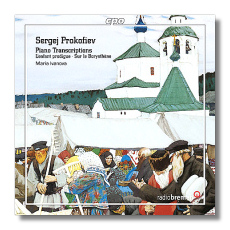
The Internet's Premier Classical Music Source
Related Links
- Prokofieff Reviews
- Latest Reviews
- More Reviews
-
By Composer
-
Collections
DVD & Blu-ray
Books
Concert Reviews
Articles/Interviews
Software
Audio
Search Amazon
Recommended Links
Site News
 CD Review
CD Review
Serge Prokofieff

Piano Transcriptions
- L'Enfant prodigue, Op. 46
- Sur le Borysthène, Op. 51
Maria Ivanova, piano
CPO 777093-2
This recording was a delightful surprise! Most piano transcriptions fall considerably short in comparison with their orchestral counterparts. After all, the composer makes an adaptation from the original, scaling down certain aspects of orchestration and harmony, often making considerable concessions to accommodate the limitations of the keyboard and one pair of hands. But here, the music brims with a Prokofieffian character and for once boasts an advantage over the original scores, especially in the case of Sur le Borysthène: the pianist here, Maria Ivanova, delivers such insightful performances, deftly capturing Prokofieff's harmonies, rhythms and sometimes complex themes, that nearly everything is heard in proper balance, something sound engineers cannot easily achieve in the recording process for an orchestra.
Ivanova conveys the subtleties of these scores, their boisterous moments, their intimacies and wit, their often intricate rhythmic elements, and their not always easily-grasped melodies. After hearing these performances, I can surmise with some certainty that she would make an excellent conductor. Listen to how she phrases tricky, though seemingly simple sections, like L'Enjôleuse (track 3), which leads off with the jaunty tune that many listeners will recognize as the main theme of the Fourth Symphony's Scherzo. Here, she is relaxed and witty, deftly capturing the insolence and bite, especially later on in the goofy march-like theme. Or hear her brilliant rendering of Pillage (track 7), where she perfectly conveys the mixture of menace and ghostly energy. Her phrasing of the beautiful closing section, Le rétour, is as meltingly lyrical as one could want: she makes the piano sing, conceding little to the richer scoring of the string-dominated sonorities of the original.
In Sur le Borysthène (or On the Dnieper, as it is more properly called), again Ivanova's up to the challenge, making a comparatively arid Prokofieff work sound more engaging. Try her opening, Prélude, where she infuses Prokofieff's delicate but slightly detached lyrical outpourings with a sense of warmth. Ivanova captures all the contrasts in the ensuing Recontre, deftly moving from the energy and ironies of the opening to the playful jaunt of the middle section. The dark lyricism of Fiançailles, which contains one of Prokofieff's most memorable, if weirdly-crafted melodies – the kind of theme that might have been appropriate for Roméo and Juliet were its dour nature sweetened a bit – poses no problems for Ivanova either: in her hands, the mood isn't so much brightened or lightened as given a more lyrically flowing character via her imaginative sense for unearthing the music's subtle lilt and melodic richness.
In sum, this a positively splendid offering from cpo. We should hear more of Ivanova in the future: she's clearly a major talent. The sound on the CD is vivid, and, as usual, Eckhardt van den Hoogen's notes are filled with insight and pertinent information. Highest recommendations!
Copyright © 2007, Robert Cummings




















